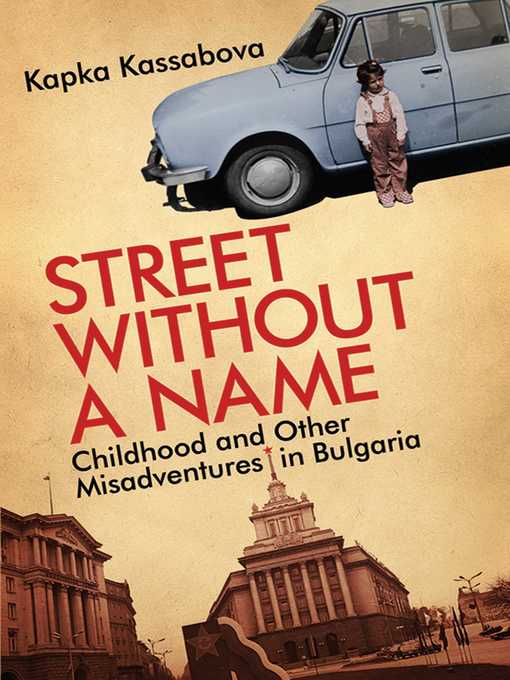
Street Without a Name
Childhood and Other Misadventures in Bulgaria
کتاب های مرتبط
- اطلاعات
- نقد و بررسی
- دیدگاه کاربران
نقد و بررسی

August 3, 2009
Novelist, poet and travel writer Kassabova takes a meandering, bittersweet journey through her native Bulgaria, where she grew up in the last decade and a half of the Cold War. Her chilling, panoramic view of life under Communism is perhaps best caught in her memory of the "rumored disaster at Chernobyl," vehemently denied by the Bulgarian government; just as nuclear rain began t fall, the citizens were forced into the streets for a mandatory May Day celebration that left many to fall sick and die within the year. Kassabova's personal history, like her country's, is full of complex characters and overwhelming challenges; one of her grandfathers, she realized later, was a homosexual struggling in a country that forbade it, and Kassabova herself developed teenage anorexia: "If you can't do anything to the world around you, you do it to yourself." Written following her return visit as a 34-year-old "global soul," Kassabova finds the country she left at 17 still devastated, but with a new measure of hope. Kassabova's tendency to travel two or three decades in a single paragraph can make her a challenge to follow, and she too often gets lost in day-to-day minutia; though engaging and illuminating as is, a more rigorous edit could have made this memoir a page turner.

May 15, 2009
A well-wrought memoir about growing up in Bulgaria during the dreary Communist years.
Nestled between Romania, Turkey and Macedonia on the Black Sea, Bulgaria is a country that Westerners know little about, likely due to its long closure from the Western world and the Slavic language barrier. Kassabova (The Best of Delhi, 2008, etc.), who spent expat years in New Zealand and Scotland, opens this history-rich country to readers. The author was raised in Sofia with her parents, both intellectuals, and younger sister in a"two-room flat in an eight-floor concrete building surrounded by thousands of identical concrete buildings, purposeful and sturdy like nuclear plants in freshly bulldozed fields of mud." Their building was called"Youth 3" (after Youth 1 and 2), and as a child Kassabova suspected that something was wrong with their meager, joyless world:"'Mum, why is everything so ugly?' To which my mother couldn't find an honest answer, except to hide her tears." At one point, the author suffered from a mysterious auto-immune disease probably resulting from the Chernobyl fallout. Some of her father's colleagues from Holland, arriving in an extravagant van wearing bright, pastel clothing and eating unimaginable treats, reinforced the family's shame and the sense that they were not equal. Education offered only"an inhabitable space in the uninhabitable Youths" and"the possibility to emigrate'internally.'" After the collapse of the Berlin Wall, when the author was 16, she and her parents were finally allowed to emigrate. Kassabova's work encompasses both her early years and her return trips to Sofia and other areas of Bulgaria, during which she visited relatives, trekked the Balkan mountains and explored Balkan history and ancient myths (Orpheus was born in the Rhodope mountains). As both an insider and outsider, the author is able to assess her complex country with a simultaneously fond and critical gaze.
Delves deeply into memory, history and imagination.
(COPYRIGHT (2009) KIRKUS REVIEWS/NIELSEN BUSINESS MEDIA, INC. ALL RIGHTS RESERVED.)

March 15, 2009
Bulgaria is an alien land to most of uswe might visit it someday, but we wouldn't want to live there. In the 1970s and 1980s when poet Kassabova was growing up, Bulgaria was grimly Communist. Her delightful and insightful book is an elegiac paean to a country she couldn't wait to leave but now can't get out of her head. The wonder is that individuality survived at all during those stifling years of government-enforced mediocrity, but it did, as is abundantly clear in Kassabova's vivid descriptions of family, friends, and teachers. Years later, she went back for a visit. Much had changed, but more had not. Manufactured goods were still scarce or nonexistent; service was given begrudgingly or not at all. Old towns had been bulldozed to erect shoddy townhouses, and the Bulgarians still hated the Turks. Kassabova's readers will learn much about a country they generally don't even think about, sometimes laughing out loud and sometimes simply stopping to reflect. In fact, it's hard to imagine anyone who wouldn't benefit from this lovely book.David Keymer, Modesto, CA
Copyright 2009 Library Journal, LLC Used with permission.

July 1, 2009
The author was born in 1973 in Bulgaria, one of the Communist blocs most oppressive and depressingly underprivileged states. When she was 17, after the fall of the Berlin wall, her family immigrated to New Zealand, and Kassabova devoted herself to forgetting her homeland. Then, having spent half her life separating herself from Bulgaria, she returned there and reacquainted herself with the place where she grew up. This memoir, which combines memories of Kassabovas childhood with reflections on contemporary events, is charming, funny, and extremely informativeas she notes, Bulgaria, to most Westerners, is a country without a face. Reading the book is like traveling not merely to a foreign country but to another planet. The author is frank in her description of her native country (she calls it dull, drab, ugly), but its easy to spot an underlying current of nostalgia, a feeling that, although its true that you cant go home again, it might be nice if she could. A touching personal investigation of what it means to have a love-hate relationship with a place.(Reprinted with permission of Booklist, copyright 2009, American Library Association.)

























دیدگاه کاربران